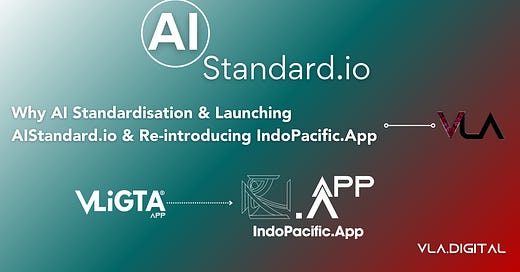[Major Update] Why AI Standardisation Matters for Bharat
From Abhivardhan and the ISAIL Secretariat
This is a post authored by Mr Abhivardhan, our Chairperson.
As May is nearing an end, we have already showcased some of the most comprehensive AI and Law training programmes (https://lnkd.in/gKJkXhwm). Do check them out.
Complete post: https://www.indicpacific.com/post/why-ai-standardisation-launching-aistandard-io-re-introducing-indopacific-app
Meanwhile from the Indian Society of Artificial Intelligence and Law:
Now, I could have shared some random ChatGPT-prompted insight on some random US Senate policy document on AI, or some Council of Europe AI Treaty, or some random B-Tech report by the United Nations.
Trust me - I was thinking only that I avoided doing it.
Why?
Most of these "AI policy" or "technology policy" documents hardly bring any outcome. The transformation of AI in terms of economics and evolution, is nascent.
People & sadly Elon Musk will make you believe AGI is coming soon, but that is not happening.
So let's prepare ourselves for two problems associated with AI, law & policy. Just two problems (let's make it simple):
What exactly do we need to regulate about AI? If yes, then why? If no, then why?
What can be done about high-risk AI systems owned by MNCs like OpenAI & others?
Start rationalising AI standards - focus on what could be standardised for legal-ethical & technical benchmarking.
Trust me - nobody across governments has a clear idea as to what could be "regulated" effectively. China may be a relentless exception, but no major government has any idea. Hence, such knee-jerk reactions come and go.
Say hello to aistandard.io, a consortium of AI standards to be developed under the Secretariat of the Indian Society of Artificial Intelligence and Law in conjunction with the policy insights of Indic Pacific Legal Research LLP.
We believe AI standardisation can be open-source in some cases, and proprietary in some cases. It will be a long effort.
Here are some basic principles on AI Standardisation we have agreed at a Secretariat level:
1️⃣ Sector-Neutral & Sector-Specific: Guidelines must apply across all sectors while considering specific requirements for relevance and effectiveness.
2️⃣ Legal-Ethical & Technical Benchmarking: Combine legal-ethical principles like privacy and fairness with technical benchmarks to track AI evolution.
3️⃣ Flexibility & Adaptability: Ensure guidelines are flexible to adapt to India's evolving AI landscape, allowing for innovation and growth.
4️⃣ Credible Use Case Focus: Prioritize genuine AI use cases and critically evaluate company claims to avoid hype.
5️⃣ Interoperability & Market Integration: Promote standards that ensure seamless integration and foster competition and innovation.
6️⃣ Multistakeholder Participation: Engage diverse stakeholders with transparent, accountable protocols for collaboration.
7️⃣ Recording & Quantifying AI Use Cases: Document and assess AI use cases to track technological development and impact.




